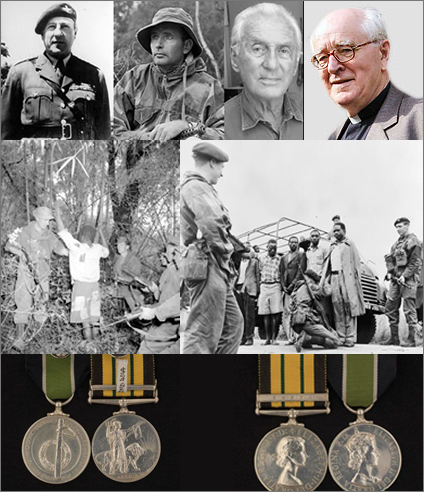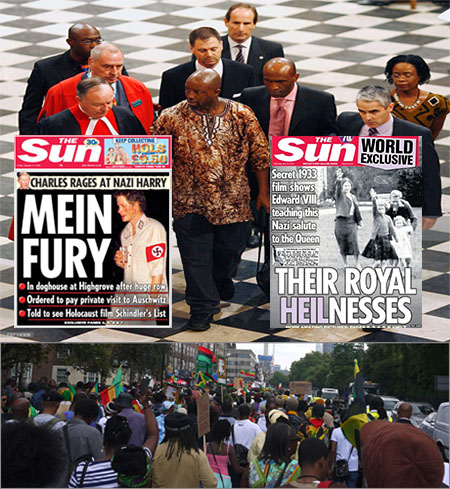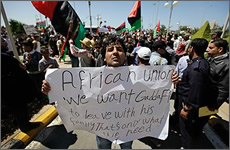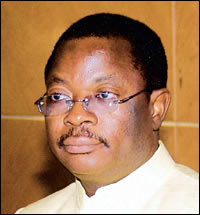This follows the settlement of the historic case against the British government by a group of survivors, Ndiku Mutua, Paulo Nzili, 85 Wambugu Wa Nyingi, 84, Jane Muthoni Mara, 73 and Susan Ngondi who were Kenyan victims of illegal detainment and atrocities in Kenya during 1950 to 1963.
British Foreign Secretary, William Hague stated that the Government denies any liability for the actions of the colonial administration in respect of their claims.
This is despite the availability of corroborating testimony from key witnesses and the unveiling of secret archives containing thousands of government files detailing how the crimes took place under direct British jurisdiction.
Noted historians such as Professor David Anderson, Professor Caroline Elkins, and Dr Huw Bennett have all provided testimony supporting claims that there is incontrovertible evidence confirming that British officers were responsible for innocent Africans being tortured, roasted alive, sexually assaulted, manacled, buggered and bludgeoned to death. With some of the perpetrators involved having admitted their war crimes in government files, filmed documentaries and published books, Toyin Agbetu of the Ligali organisation believes the case against them and the British government for committing war crimes is easy to make.
The 1958 edition of The UK Military Manual stated that;
“The term “war crime” is the technical expression for violations of the law of warfare, whether committed by members of the armed forces or by civilians... Similarly, all other violations of the [1949 Geneva] Conventions not amounting to ‘grave breaches’ are also war crimes.”
In 1951, Westminster Parliament (UK) also ratified the European Convention on Human Rights (ECHR). The Convention came into force in 1953.
During 1950 – 1963 British officers were responsible for;
- A 15-year-old she being “arrested as a Mau Mau spy and, among other things, tortured under the supervision of a British army officer by being raped with a bottle filled with hot water.”
- “Interrogation under torture was widespread. Many of the men were anally raped, using knives, broken bottles, rifle barrels, snakes and scorpions. A favourite technique was to hold a man upside down, his head in a bucket of water, while sand was rammed into his rectum with a stick.”
- “the burning alive of detainees”
- “Women were gang-raped by the guards. People were mauled by dogs and electrocuted. The British devised a special tool which they used for first crushing and then ripping off testicles. They used pliers to mutilate women’s breasts.”
- “More than 1,000 Kenyan men met their death at the end of a hangman’s noose, many after confessions they said were tortured from them.”
- “Thousands were beaten to death or died from malnutrition, typhoid, tuberculosis and dysentery. In some camps almost all the children died.”
- “They cut off inmates’ ears and fingers and gouged out their eyes. They dragged people behind Land Rovers until their bodies disintegrated. Men were rolled up in barbed wire and kicked around the compound.”
Indeed, Caroline Elkins (2005) and David Anderson’s (2005) books on the topic rendered some particular gruesome scenes from interviews;
- “Things got a little out of hand. By the time I cut his balls off, he had no ears, and his eyeball, the right one, I think, was hanging out of its socket. Too bad, he died before we got much out of him.”
- “I stuck my revolver right in his grinning mouth and I said something, I don’t remember what, and I pulled the trigger. His brains went all over the side of the police station. The other two Mickeys [Mau Mau] were standing there looking blank. I said to them that if they didn’t tell me where to find the rest of the gang I’d kill them too. They didn’t say a word so I shot them both. One wasn’t dead so I shot him in the ear. When the sub-inspector drove up, I told him that the Mickeys tried to escape. He didn’t believe me but all he said was ‘bury them and see the wall is cleared up.’”
In a letter from Police Commissioner Arthur Young to Governor Evelyn Baring, 22 November 1954 he wrote “[T]he horror of some of the so-called Screening Camps now present a state of affairs so deplorable that they should be investigated without delay, so that the ever increasing allegations of inhumanity and disregard of the rights of the African citizen are dealt with and so that the Government will have no reason to be ashamed of the acts which are done in its own name by its own servants.”
Despite this, the British government went on to approve its abusive ‘Cowan plan’ which authorised the unlawful use of violence against African people.

Enoch Powell spoke out against Britain’s Mau Mau Terror Camps.
Seeking Justice
In a letter from the Ligali organisation to Dominic Grieve, the Attorney General and the Keir Starmer, Director of Public Prosecutions a formal request was made calling for the Crown Prosecution Service (CPS) to use the available evidence to prosecute those responsible for these war crimes.The letter names men such as;
- John Cowan, the sadistic senior superintendent of prisons in Kenya from 1957 to 1963.
- Second Lieutenant David Larder, who quit after admitting killing an African when he was nineteen.
- Terence Gavaghan, who admitted that a “resistor... was put on the ground, a foot placed on his throat and mud stuffed in his mouth”
- Alan Lennox-Boyd, secretary of state for the colonies
- Eric Griffiths-Jones, the attorney general of Kenya, who drafted changes to the law enabling abuses where those who protested would have their throats crushed and mouth stuffed with dirt before being rendered unconscious.
Sadly others such as Major-General Ian Stuart McWalter Henderson aka the ‘Butcher of Bahrain’, Lieutenant General Sir Gerald, Evelyn Baring, the governor of Kenya and Frederick Crawford, the Deputy Governor of Kenya from 1953 to 1957 have since died escaping justice.
It is the Ligali position that no amount of settlement money should be able to facilitate a decision allowing the British government to pervert the course of justice. It is imperative that investigations begin into the wartime actions of men such as Sir Arthur Hardinge, Colonel Bufton Tufton and colonial officer John Allen. If a criminal act is discovered then they should be prosecuted even if the doctrine of joint enterprise needs to be used to arrest those that engaged with and/or cultivated support for the atrocities.
A few conscientious Europeans, men such as John Nottingham, a former colonial officer have spoken out about the abuse of innocent Africans they witnessed at the time.
Also, on 27 July 1959, the controversial Tory MP, Enoch Powell gave a speech stating that the British government cannot “pick and choose where and in what parts of the world we shall use this or that kind of standard. We cannot say, ‘We will have African standards in Africa, Asian standards in Asia and perhaps British standards here at home’. We have not that choice to make. We must be consistent with ourselves everywhere. All Government, all influence of man upon man, rests upon opinion. What we can do in Africa, where we still govern and where we no longer govern, depends upon the opinion which is entertained of the way in which this country acts and the way in which Englishmen act. We cannot, we dare not, in Africa of all places, fall below our own highest standards in the acceptance of responsibility”
Toyin Agbetu agrees and said;
“This is not an issue I or any other conscientious Pan Africanist can let drop, it doesn’t matter how much blood money is splashed around. My biggest concern right now is that entrenched within the Prosecution of Offences Act is a convention where the Attorney General has the power to direct the CPS how to act in special cases.
This could lead to a malicious attempt by government officials to extend the timeframe of the judicial process in the hope of more witnesses passing away to weaken the case for the prosecution or enable war criminals to escape justice.
However if the Director of Public Prosecutions (DPP) has the integrity to adhere to the ‘Statement of Ethical Principles for the Public Prosecutor’ (SEPPP) then this case should proceed in a court of law as soon as possible.
You see the SEPPP code calls upon prosecutors to act with the highest ethical standards and, crucially, in the best interests of justice.
Consider the most recent inquest into the deaths of the 96 victims at the Hillsborough disaster. This was able to proceed because the discovery of new facts and evidence made it necessary in the interests of justice that a new inquest should be held. In this case where war crimes were committed against innocent Africans in Kenya the discovery of a cache of secret documents satisfies the same criteria.
For a DPP to be acting with any moral legitimacy, the interests of the government of the day, should not and must not be allowed to interfere with or pervert the course of justice.
That is the whole point of the CPS having prosecutorial independence.
The Attorney General does has a duty to serve as a Guardian of the Public Interest and in forwarding this case to the DPP who have now placed the issues under review I would seem this responsibility has been upheld, at least publicly.
The world’s eyes now firmly rest upon the British justice system - there will not be a good day to bury bad news.
We can only now hope the CPS does not fail in its duty to prosecute the war criminals with the same vigour as the British prosecutors at the Nuremberg trials did with Nazi suspects.
Perhaps then, the British Government will see fit to make a heartfelt apology and reparate for its crimes.
If it does not then we will require this case to be heard at the Hagues’ International Criminal Court (ICC).
Human rights are not 'white', they are for all.
Keir Stramer, it is up to you.”

British War Criminals (Top): Gerald Lathbury, Ian Henderson, Terence Gavaghan, John Allen (Middle) British Army humiliate children and terrorise Africans in Operation Scaramouche (Bottom) African OBE –‘Africa General Service’ medals for terrorism
External Links
Torture and killing in Kenya – Britains double standardsDeny the British empire’s crimes? No, we ignore themhBritish Mau Mau abuse papers revealedJohn Nottingham Seeking Mau Mau JusticeImperial War Museum - Campaign Pictures
Ligali is not responsible for the content of third party sites
Britain pays £20m bribe to save war criminals from justiceNuremberg: Nazis On Trial
Speak Out!
Empire on Trial: What will it take for there to be a ‘Nuremberg’ like trial for the victims of Maafa (the trans Saharan, trans Atlantic and colonial enslavement of Africa)?Click here to speak out or read (4) comments about this article
If Keir Stramer, the Director of Public Prosecutions has the integrity to adhere to the ‘Statement of Ethical Principles for the Public Prosecutor’ (SEPPP) then this case should proceed in a court of law as soon as possible.
Toyin Agbetu, Ligali Organisation
See Related:





Get involved and help change our world